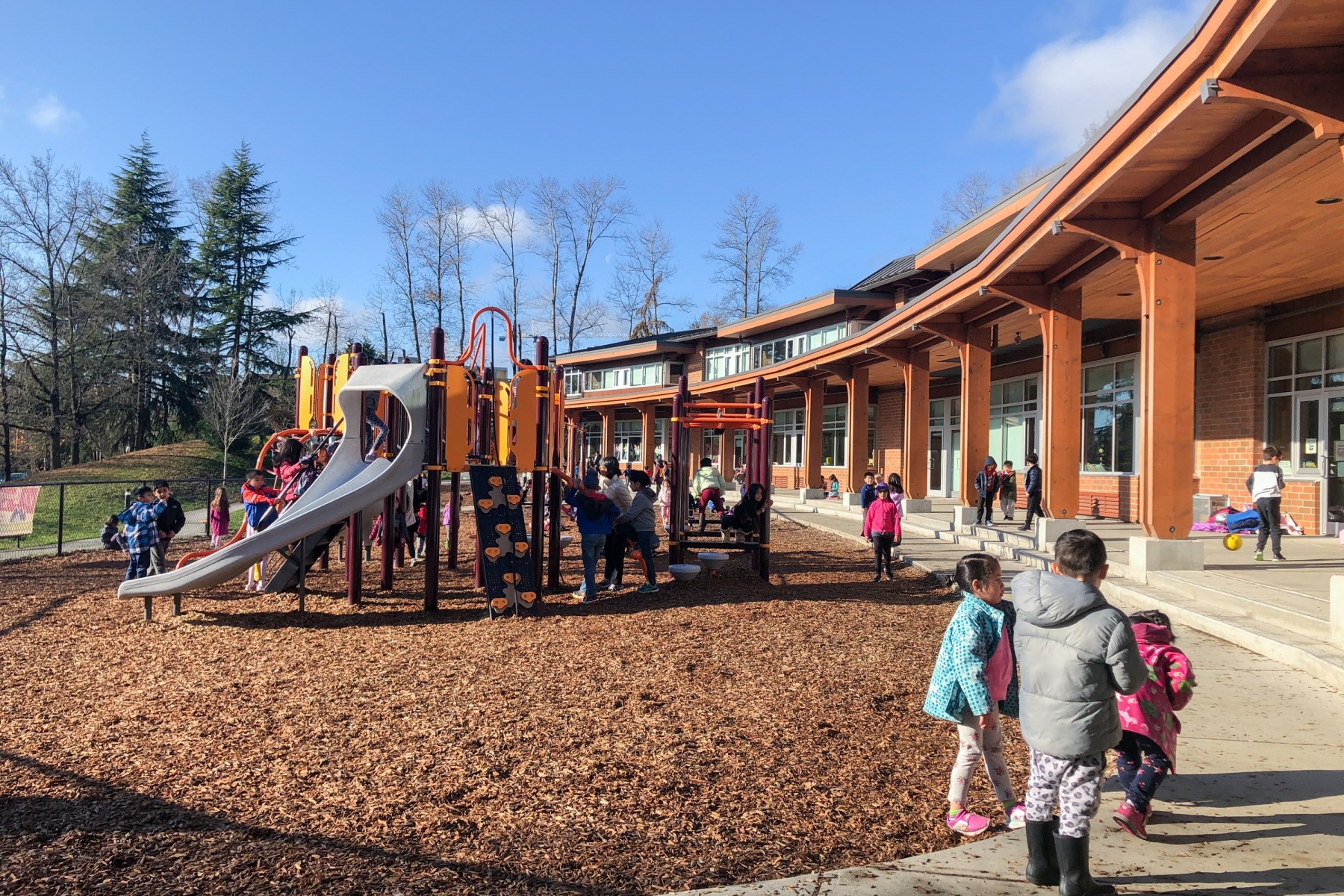2024 Guide to Canada's Education System: Navigating Schools and Universities

Canada’s educational system is known around the world for its excellence in delivering exceptional programs.
Public school is free on an elementary and secondary level, and private schools offer a more tailored environment with specialised programs. International students find a welcoming environment with language options, scholarship opportunities, and government support.
Keep reading to learn more about education in Canada and how to navigate the country’s top-notch schools and universities:
Elementary/Primary School in Canada

Canada is a safe, inviting country to raise a family. One of things that makes Canada so appealing for families is its exceptional primary education system.
Elementary school in Canada starts with kindergarten and goes to grade 8, except in Quebec which has only 6 grades. Children in Canada enter kindergarten at age 4 or 5. Elementary school prepares young students to enter high school.
Most provinces have the school year start at the end of summer break in September, right after the Labour Day holiday weekend. The school year ends in June. The school day is generally 6 hours long, and Canadian primary schools offer diverse after-school activities such as sports, theatre, dance and music.
High School/Secondary School in Canada

Canadian teenagers get to take part in one of the best secondary educational systems globally. Academic learning is top ranking and Canadian high schools are known for their extracurricular activities such as sports, visual arts, theatre and outdoor programs.
Canada shines on the world’s stage when it comes to education. The Organisation for Economic Co-operation and Development (OECD) evaluates schools across the world, and Canada consistently outperforms competing countries in areas like high-school level maths, science, and reading. Canada leads the pack in delivering exceptional secondary education.
High School begins in grade 8, 9 or 10 and goes to grade 12 in most provinces and territories. In Quebec, high school starts in grade 7 and ends in grade 11. After completing high school, students receive a diploma which then allows them to enter college or university.
The High school year is the same as elementary school. The school year begins at the end of summer break, starting in September, right after the Labour Day holiday weekend, and ends in June.
READ: Navigating Public and Multicultural Holidays in Canada
Public school, Private School and School Fees

Canada recognises that education is a human right and offers free public primary and secondary schooling for citizens and permanent residents. However, schools may charge a small fee for students to participate in extra activities such as sports and field trips.
In Canada, primary and secondary private schools charge tuition and deliver the same curriculum as public schools. Private schools may deliver teachings with smaller class sizes and specialised programming. Some private schools are not co-ed, and many require the student to wear a uniform.
Private elementary and high schools include boarding schools with onsite accommodations. Examples of alternative elementary private schools in Canada include Montessori and Waldorf. Both elementary and high school levels offer private International Baccalaureate schools, as well as Arrowsmith schools for students with learning disabilities. Private high schools can also include specialised sports programs for gifted athletes.
Colleges and Vocational Schools
College life in Canada can be a lot of fun and students get to attend some of the most reputable colleges in the world.
Canadian Colleges and vocational schools work with business and industry to design programs offering hands-on training and skill building. Internships, co-op programs and work placements are great ways to gain experience in the real world while you complete your studies.
Through Canadian college programs you can earn a certificate, diploma or postgraduate diploma, and academic and applied degrees. College-level university transfer programs offer the first 2 or 3 years of a bachelor’s degree.
Canadian college programs include but aren’t limited to:
-
Agriculture and agri-food
-
Broadcasting and journalism
-
Business
-
Dental hygiene
-
Design
-
Engineering technology
-
Environment
-
Health
-
Hospitality management
-
Information and communications technology
-
Languages and arts
-
Sciences
-
Social services
Canadian colleges host more than 400 specialised research centres, laboratories and Technology Access Centres, giving students access to advanced technology, equipment, mentorship and expertise.
Canadian Universities

According to the QS World University Rankings in 2021, Canada is home to 10 of the top 250 universities in the world. The country hosts over 100 public and private universities that cover all fields of study and offer various degree programs:
-
Undergraduate and postgraduate programs
-
Professional designations
-
Certificate and diploma courses
-
Short career-focused programs
-
Co-operative education and internships
Canadian bachelor, master and doctorate (PhD) degrees are equivalent to those offered in other Commonwealth countries and the United States.
Post-secondary students in Canada can choose to study in English or French, and most schools have online or distance learning options.
College and University Tuition, Scholarships and Loans
College programs are often shorter than university studies, making them less expensive. In general, public colleges are more affordable than private ones. Some college programs include work-integrated learning and paid apprenticeships so you can earn an income while you study.
Tuition fees for international students are generally higher than those for citizens and permanent residents.
Many Canadian institutions offer scholarships, sponsorships, fellowships or grants to supplement the cost of your studies. As well, the federal and provincial governments offer student loans to make post-secondary education more accessible to certain demographics who otherwise may not be able to further their education.
International Students
Did you know that Canada hosts the largest Mandarin-speaking population outside of Canada and the largest Punjabi-speaking population outside of India? Part of the reason for this is Canada’s propensity towards welcoming international students into its schools.
International students can choose to study in English, French or both languages. In Quebec, elementary and high school level schooling occurs in French, unless the parents complete a special application form to have their child study in English. Most university-level courses are taught in English with the exception of Quebec programs.
READ: New Study Reveals Top 10 Countries Most Interested in Relocating to Canada
3 Notable Canadian Universities
Canada is home to many incredible universities. The top three universities in Canada are:
-
Toronto’s University of Toronto
-
Montreal’s McGill University
-
Vancouver’s University of British Columbia
University of Toronto

The University of Toronto (or U of T) is recognised as one of the best research-intensive institutions globally. Students can choose from over 700 academic programs and learn from top minds from every conceivable background and discipline.
Fun Fact! On September 24, 2020, U of T announced the single largest donation in the history of Canada. The donation was a $250 million gift to the Faculty of Medicine from Canadian philanthropists James and Loise Temerty.
Despite the school’s challenging academic standards, students appreciate U of T for its strong sense of school spirit. Located in downtown Toronto, students have easy access to the most multicultural region in Canada and a huge and diverse selection of extracurricular activities.
McGill University

Known as “the Harvard of Canada”, Montreal’s prestigious McGIll University’s students have the highest average entering grades in Canada. McGIll students have won more national and international awards than any other Canadian university.
Fun fact! McGill University was the first education institution in Canada to award a medical degree. Mcgill is famous for its health and chemistry programs and hosts a team of scientists who are global leaders and innovators in the study of epigenetics.
Many American and international students choose to complete their degrees at McGill due to its tuition fees being significantly lower than those of institutions in their home countries.
University of British Columbia

The University of British Columbia (or UBC) is ranked #2 for top Canadian universities. UBC has two campuses: Vancouver and Okanagan.
Known for its science programs, UBC’s Vancouver campus hosts TRIUMPF - a laboratory specialising in particle and nuclear physics. TRIUMF is owned and operated by a consortium of eleven Canadian universities.
The Vancouver campus runs a centre for Indigenous activities in a traditional pacific northwest-style longhouse, called the First Nations House of Learning. The university has an associate dean of Indigenous Education and has developed a governing board and senate policies as well as First Nations-governed council within the university structure.
Unique and Innovative Ways to Learn in Canada
We all know now that there are many different ways to learn. Canada has a number of schools that go about education a little differently—developing distinct approaches to make learning more fun, stimulating and effective for students. Here are a few examples of institutions that provide unconventional educational paths for Canadians:
-
SelfDesign Learning Academy - This B.C.-based non-profit allows for the parent and student to work one-on-one and design their own personalised learning path from grades K-12. SelfDesign’s unique approach combines home, online and community-based education. Learners connect with peers and certified educators online, with optional group opportunities, in-person events and specialised programs such as hands-on work experiences and apprenticeships.
-
Outdoor Education Leadership Program - OELP is an outdoor education leadership program for grades 7 and 8 at Slocan, BC’s W.E. Graham Secondary School. Students take part in camping, hiking, biking, skiing and canoeing trips, including overnight stays. Students learn valuable skills such as organisation, personal care in extreme weather conditions, teamwork and perseverance to overcome challenges. Students learn with traditional literacy and numeracy learning, the program aligns with the B.C. curriculum’s Core Competencies of Communication, Thinking and Personal Competency.
-
French Immersion - Many school boards in Canada offer French Immersion starting in kindergarten. In total immersion, students receive all education instruction in French. English studies are then introduced in grade three or four depending on the province. Early years are the best years to absorb and learn a language making French immersion a highly effective way to develop French speaking and writing skills.
-
En’owkin Centre - The Okanagan’s En’Owkin Centre is an Indigenous, cultural, educational, ecological and creative arts organisation. En’owkin exists to develop and implement Indigenous knowledge and systems, both at the community and international levels. Educational programs include a professional artist training program, Nsyilxcen Language certificate and diploma programs, foundation certificate program in Indigenous fine arts, and the Aboriginal Access program which allows First Nations students to enrol in university courses without having to be part of a degree program.
If you and your family are moving to Canada or you are moving here to attend a Canadian school, connect with us at Top Move. We will help you plan your move with efficiency and affordability in mind, so that you can keep your focus on your or your children's studies.
What do our customers say?


What’s happening?
Please notify us of any violations. This information will be kept confidential and shared only with Top Move.
- It’s inaccurate or incorrect
- If you find it offensive
- It’s something else



![The Most Popular Cars in Canada [2024] The Most Popular Cars in Canada [2024]](https://cdn.topmove.ca/image/blog/36030c8ff5b02905bc010edbaa3b2d1c.jpeg)












